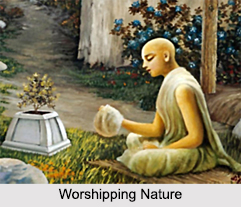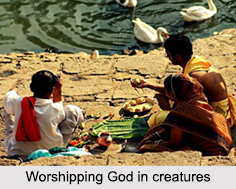 Bhakti Marga, or the path of devotion, indicates the law of the right activity of the emotional side of man. Bhakti is emotional attachment distinct from knowledge or action. Through it a person offers emotional possibilities to the divine. Emotion expresses a living relation between individuals, and becomes instinct with the force of religious feeling when it binds God and man. It is also mentioned in Bhagavad Gita that if human beings do not love and worship, they become shut within the prison of their own egoism. This way, when rightly regulated, leads them towards the perception of the Supreme Being. It is open to all, the weak and the lowly, the illiterate and the ignorant, and is also the easiest. The sacrifice of love is not as difficult as the tuning of the will to the divine purpose or ascetic discipline, or the strenuous effort of thinking. It is quite as efficacious as any other method, and is sometimes said to be greater than others, since it is its own fruition, while others are means to some other end.
Bhakti Marga, or the path of devotion, indicates the law of the right activity of the emotional side of man. Bhakti is emotional attachment distinct from knowledge or action. Through it a person offers emotional possibilities to the divine. Emotion expresses a living relation between individuals, and becomes instinct with the force of religious feeling when it binds God and man. It is also mentioned in Bhagavad Gita that if human beings do not love and worship, they become shut within the prison of their own egoism. This way, when rightly regulated, leads them towards the perception of the Supreme Being. It is open to all, the weak and the lowly, the illiterate and the ignorant, and is also the easiest. The sacrifice of love is not as difficult as the tuning of the will to the divine purpose or ascetic discipline, or the strenuous effort of thinking. It is quite as efficacious as any other method, and is sometimes said to be greater than others, since it is its own fruition, while others are means to some other end.
The origin of the Bhakti Marga is hidden in the mists of long ago. The upasana theory of the Upanishads and the devotional way of the Bhagavatas has influenced the author of Bhagavad Gita. The love that a person feels for an object involves an element of separateness. Devotion to the Supreme is possible only with a personal God, a concrete individual full of bliss and beauty. It is also mentioned that personality implies a capacity for fellowship, or communion, or a feeling together. There is the personal need for a personal helper. So God, into whose being the heart of love enters, is not the God who revels in bloodshed, not one who sleeps in serene abstraction while hearts heavy-laden cry out for help. He is love. He who gives up his whole to God and falls at His feet finds the gates of spirit lie open.
 It is not a rigid law of recompense that binds God to the world. The consequences of deeds may be averted by means of devotion to God. This is no suppression of the law of karma, since the law requires that even devotion should have its reward. Man is the object of God`s constant care. The nature of love towards God or Bhakti is indescribable even as the taste of the dumb person. There is the adoration of something looked upon as absolutely perfect. Since the object is perfection, nothing less than the highest conceivable will do. It is also stated regarding Bhakti Marga that the object of devotion is the highest being, or Purusottama. He is the illuminator of souls. God is not to be identified with the different elements which seem to be the ultimate realities at a lower level. He is not to be confused with the several personal agencies which the mind of man attributes to the natural forces. He is all these and more.
It is not a rigid law of recompense that binds God to the world. The consequences of deeds may be averted by means of devotion to God. This is no suppression of the law of karma, since the law requires that even devotion should have its reward. Man is the object of God`s constant care. The nature of love towards God or Bhakti is indescribable even as the taste of the dumb person. There is the adoration of something looked upon as absolutely perfect. Since the object is perfection, nothing less than the highest conceivable will do. It is also stated regarding Bhakti Marga that the object of devotion is the highest being, or Purusottama. He is the illuminator of souls. God is not to be identified with the different elements which seem to be the ultimate realities at a lower level. He is not to be confused with the several personal agencies which the mind of man attributes to the natural forces. He is all these and more.
For true bhakti, one requires first of all Shradh or faith as it is one of the vital elements. The infinite presents itself to the human soul in a variety of aspects. Bhagavad Gita allows freedom to the multitudes worshipping ksudra devatas or petty divinities so long as worship is done with complete devotion. It purifies the heart and prepares the mind for the higher consciousness. The forms which bhakti takes are contemplation of God`s power, wisdom and goodness, constant remembrance of Him with a devout heart, conversing about His qualities with other persons, singing His praises with fellow-men and doing all acts as His service. It is devotion that is constant. True devotion issues in unselfish conduct. It is obvious that for those who insist on devotion as the final nature of spiritual life, the end is not an immersion in the eternal impersonal, but a union with the Purushottama.



















